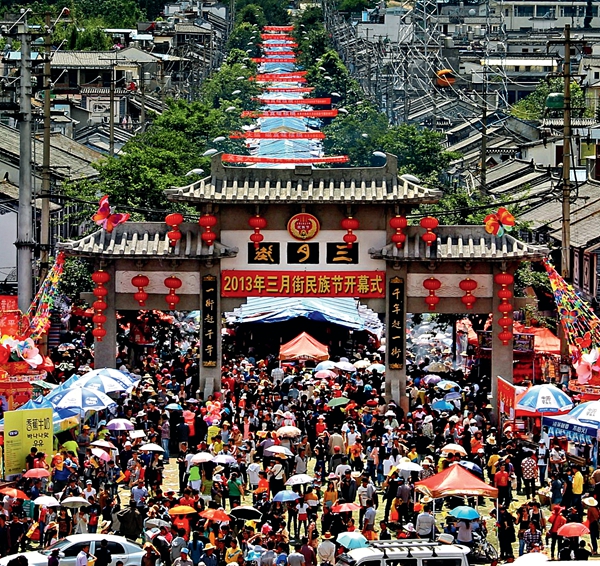Tips in Dali
 0 Comment(s)
0 Comment(s) Print
Print E-mail China Today, January 8, 2018
E-mail China Today, January 8, 2018
The Old Town of Dali
The architectures in the Old Town of Dali were built at the end of the 14th century. Covering an area of about three square kilometers, it is surrounded by moats and walls. Each wall has a gate and a gatetower above it, while each corner also has a tower. The buildings in the town are uniform in style, featuring dark grey tiles and brick walls. Old buildings stand one by one along the streets with creeks running beside them. There are some guesthouses that have been transformed from Bai-style houses, ideal places to experience local life. At night, the old town comes alive with singers performing in bars along the streets and vendors selling local snacks, handicrafts, flowers, and fruits.
Transportation: Take bus No.4 or No.8.
The Zhangs' Garden

The Zhangs' Garden is one of the many places in Dali for visitors to appreciate camellia flowers, but what makes it special are the many species of camellias – 87 local species, 128 species of East China, and 190 foreign species. The garden grows nearly 10,000 pots of flowers. During the blossoming season, gardeners will collect flowers and place them on the water surface in porcelain bowls and stone vats. In addition, the garden has lovely yards and traditional Bai-style houses. It is a good choice to experience the Bai's life by appreciating flowers, enjoying a cup of local tea, and watching a local tea ceremony.
Transportation: Take bus No.4 and get off at Guanyintang Stop.
The Third Month Fair

The Third Month Fair, which falls between the 15th and 21st day of the third month on the lunar calendar, is a grand festival of the Bai people. It is celebrated at the foot of the Cangshan Mountain in west Dali City. It started as a religious activity, but later developed into a grand gathering for locals to exchange goods and enjoy entertainment activities such as singing and dancing, horse racing, and assorted ball games.
Three-Course Tea
The Bai people have formed their unique tea culture on offering tea to guests. It is known as the "Three-Course Tea." That means the tea comes in three styles. In the first round, the Bai people place an empty teapot on the fire until its surface is hot. Then they put a handful of tea leaves inside the teapot, and shake it to make sure the tea leaves are evenly baked. When the tea leaves turn yellow and emit an aroma, they pour boiled water into the teapot. The tea looks amber and tastes bitter. The host will offer a half cup of tea to guests, who are expected to drink at one time. In the second round, the Bai people make the tea the same way, but they add some brown sugar, cheese slices (a local product), and cinnamon to sweeten the mixture. In the third round, the Bai people still make the tea the same way, but they add honey, puffed sticky rice, dry Sichuan pepper, and ground walnuts, so the tea has various flavors, including sweet, sour, bitter, and spicy, and rich aftertastes. The Three-Course Tea also reflects the philosophy that life is both bitter and sweet, but every moment is cherished when looked back on.
Three Pagodas of the Chongsheng Temple
Situated 1.5-kilometers northwest of the Old Town, the Three Pagodas are a symbol of Dali. They face the Erhai Lake on their east, and consist of one big pagoda and two smaller ones. The big one is 69.13 meters high, and has 16 stories. Inside the pagoda there is a spiraling wooden staircase leading to the top, and the structure features the architectural style of the Tang Dynasty (618-907). The other two pagodas standing to its north and south are 42.19 meters high. Octagonal in shape, they are made out of solid brick and 10 stories high. The body is decorated with figures of Buddha, lotus flowers, and vases. They are of great value in terms of history, culture, and architecture.
Transportation: The Three Pagodas are about a 1.5-kilometer walk from Dali Old Town.
Nanzhao Folklore Island

Nanzhao is one of the three islands on the Erhai Lake. Visitors need to take a ferry to reach it. They can take a boat at the pier in Shuanglang Village, or take a ferry at the Erhai Pier. It is a nice experience to walk on Nanzhao Island as it offers different sceneries of the Cangshan Mountain and the Erhai Lake from different angles.





